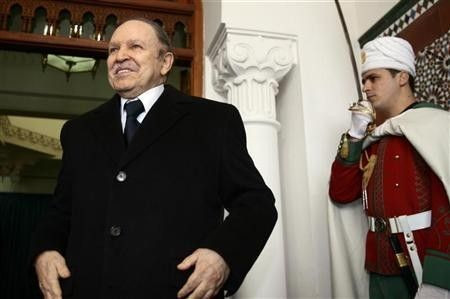Algeria promises to end emergency rule after 19 years

In a probable response to the unrest rolling through the Middle East and North, Algerian President Abdelaziz Bouteflika has reportedly promised to lift the country’s state of emergency in the very near future.”
The action comes on the heels of demands by anti-government groups who have called for protests and democratic reforms.
Benjamin Stora, a French historian, and an expert on North Africa, told Reuters, this is clearly a response to the events in Tunisia and Egypt and an attempt by the Algerian authorities to get ahead of the curve and head off popular protests, as in Yemen. They would not have dreamed of lifting the state of emergency otherwise.”
According to state-run media, Bouteflika said such demonstrations will be permitted protests everywhere in the nation except in Algiers, the capital.
Earlier this year, some protesters rioted over rising food prices, prompting a tax cut by the government.
Bouteflika also reportedly instructed his cabinet members to promote job-creation and to expand the rights of all political parties air time on TV and radio.
Algeria initially imposed the emergency laws in 1992, in response to the threat posed to the government by fundamentalist Islamic groups at the time.
In that year, an Islamist party won a general election –but the triumph was annulled by the government, leading to a civil war that resulted in the deaths of at least 150,000 people.
The president explained that the state of emergency was enacted for the only purposes of the fight against terrorism, and it is this reason only which has justified maintaining it on a legal basis.
Samira Benaouda, an Algerian journalist told Reuters: Keeping the state of emergency in force didn't make sense as long as the government was saying repeatedly that terrorism was defeated. Anyway, it's a step forward to a genuine democracy.
Trade unions and others still plan to hold a mass demonstration in Algiers on February 12.
The big lesson of the current turmoil in the Arab world, which applies to Algeria too, is the emergence of a democratic movement which is not Islamist,” Stora added.
“Up to now, the rulers presented it as a straight choice between the security forces on one hand and the Islamists on the other. Now you see secular, democratic forces rising across the region and demanding change.
© Copyright IBTimes 2024. All rights reserved.





















